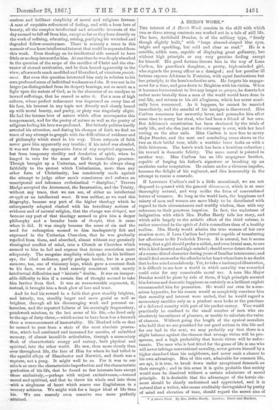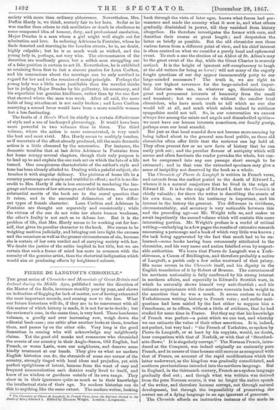A HERO'S WORK.* THE interest of A Hero's Work consists
in the skill with which two or three strong contrasts are worked out in a tale of still life. The hero, Archibald Dundas, is of the military type, "firmly though slightly built," with "large almond-shaped blue eyes, bright and sparkling, but cold and clear as steel." He is a sensible, selfish man, capable of displaying great gallantry, but without high principle or any very genuine feeling except for himself. His good fortune throws him in the way of Lena Carlton, his guardian's daughter, a pretty, high-minded girl, who regards the young officer as a demigod ; and her peculiar ill fortune exposes Adrienne la Fontaine, with equal fascinations but less principle, to the hero's seductive arts. He forgets his engage- ment for a time, and goes down to Brighton with his victim. When it becomes inconvenient to live any longer en garcon, he deserts her rather more brutally than a man of the world would have done in real life, and returns to his old allegiance, which has never nomi- nally been renounced. As it happens, he cannot be married immediately, and the scandal of his intrigue is discovered. Miss Carlton renounces her unworthy lover, and persuades him after some time to marry her rival, who had been a friend of her own. But Adrienne's constitution has been shattered by the trials of early life, and she dies just as the ceremony is over, with her head resting on the altar rails. Miss Carlton is now free to Marry Major Dundas, and the next and concluding scene shows us the two on their bridal tour, while a worthier lover looks on with a little bitterness. The hero's work has been a heartless seduction ; his reward is domestic felicity. The same moral is pointed in another way. Miss Carnets has an idle scapegrace brother, capable of forging his father's signature or breaking up an escritoire under temptation. He enlists under a virtuous impulse, becomes the delight of his regiment, and dies honourably in the attempt to rescue a comrade.
If Lawrence Carlton's end is a little sensational, we are not disposed to quarrel with the general denouement, which is at once thoroughly natural, and very unlike the fates of conventional heroes of romance. So long as the world lasts, the happiness and misery of men and women are more likely to be distributed with regard to their circumstances and worldly wisdom, than with any reference to their generous impulses. In fact, the undertone of indignation with which Mrs. Duns Hardy tells her story, and which adds largely to the artistic effect of the third volume, is rather conceived in the spirit of Job's counsellors than of a healthy realism. Mrs. Hardy would admire the true woman of her own creation more, if Lena Carlton had proved capable of transferring her affections to Sir Frederick Trevor. It is natural, but it seems wrong, that a girl should prefer a selfish, and even brutal man, to one who is kind-hearted and high-minded; should never detect the secret of a coarse-fibred character during years of familiar intercourse; and shoula find excusesfor the offender in her heart whenthere is no doubt that he has acted scandalously. Yet, to take a hackneyed illustration, it is difficult to see how a world in which morality was rewarded could exist for any conceivable moral use. A man like Major Dundee would be pious by rule of three, if high principle secured him fortune and domestic happiness as certainly as a brilliant exploit recommended him for promotion. He would not even be a con- scious hypocrite, for his reason would so completely convince him that morality and interest were united, that he would regard a momentary sacrifice only as a prudent man looks at the purchase of a deferred annuity with part of his pocket-money. Vice would practically be confined to the small number of men who are absolutely incontinent of pleasure, or unable to calculate the value of chances. Without going the length of the cynical moralists who hold that we are punished for our good actions in this life and for our bad in the next, we may probably say that there is a slight balance against the chances that average virtue will be pro- sperous, and a high probability that heroic virtue will be unfor- tunate. The man who is best fitted for the game of life is one who will never infringe conventional morality, never govern himself by a higher standard than his neighbours, and never omit a chance to his own advantage. Men of this sort, admirable for common life, are apt, it is true, to break down under exceptional demands on their strength ; and in this sense it is quite probable that society would soon be dissolved without a certain admixture of moral principle. It is desirable that the advantages of the heroic ele- ment should be clearly understood and appreciated, and it is natural that a writer, who seems creditably distinguished by purity of mind and elevation of tone, should regard the secret sins of
• A Hems-Work. By Mrs. Duffas Hardy. London: Hand and Blacken.
society with more than ordinary abhorrence. Nevertheless, Mrs. Duff us Hardy is, we think, scarcely fair to her hero. So far as he was readier than others to risk mutilation or death in obedience to some compound idea of honour, duty, and professional emulation, Major Dundas is a man whom a girl might well single out for admiration and love. In seducing Adrienne la Fontaine, whom he finds deserted and starving in the London streets, he is, no doubt, highly culpable ; but he is as much weak as wicked, and the young lady is, perhaps, not very wise. The circumstances of the desertion are needlessly gross; but a selfish man struggling out of a false position is certain to act ill. Nevertheless, he is exhibited as retaining from first to last a sincere passion for Lena Carlton, and his concessions about the marriage can be only ascribed to regard for her and to the remains of moral principle. Perhaps the young lady was a little more justifiable than the novelist thinks her in judging Major Dundas by his gallantry, his constancy, and his superficial but genuine kindliness, rather than by the one flaw that showed where the man was weak. After all said, the mere habit of long attachment is not easily broken ; and Lena Carlton marrying a second lover would have been a more sensible woman but a less fascinating.
The faults of A Hero's Work lie chiefly in a certain diffusiveness of style and a use of hackneyed phraseology. It would have been more powerful in two volumes than in three. The third volume, where the action is more concentrated, is very much the best and most vivid. Mrs. Hardy seems to multiply touches, as if uncertain of the effect already produced, till the main dramatic action is a little obscured by the accessories. For instance, the domestic troubles that at last drive Adrienne la Fontaine from her home occupy several chapters, though their only purpose is to lead up to and explain the one rash act on which the fate of a life turned. One conspicuous characteristic of the author's style and tone has been already alluded to. Dealing with a painful subject, she touches it with singular delicacy. The pictures of home life in p. country parsonage are simple and truthful in effect ; and it is no dis- credit to Mrs. Hardy if site is less successful in rendering the lan- guage and manners of low attorneys and their followers. The more substantial merits of the book are in the moral question that it raises, and in the successful delineation of . two differ- ent types of female character. Lena Carlton and Adrienne la Fontaine are thought out separately and consistently ; while the virtues of the one do not raise her above human weakness, the other's frailty is not such as to debase her. But it is the problem of life, that Mrs. Hardy seems to be working out for her- self, that gives its peculiar character to the book. She seems to be weighing motives judicially, and bringing out into light the excuses and the occasions as well as the grosser circumstances of sin, because she is certain of her own verdict and of carrying society with her. We doubt the justice of the satire implied in her title, but we are certain that such a frame of mind has more in common with the serenity of the genuine artist, than the rhetorical indignation which would aim at producing effects by heightened colours.































 Previous page
Previous page